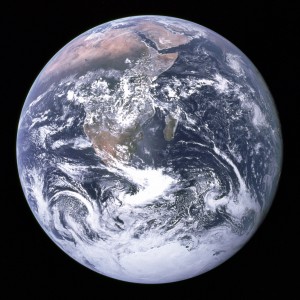
What I discovered there, which had been missing from my culturally Protestant atheist upbringing, was the idea of nature being an example of, or the evidence of, divine order and creative life force. The edges of the environmental movement were abuzz with fresh ideas, and two of the freshest were “deep ecology” and “ecofeminism,” both of which had a spiritual dimension. (Fr. Thomas Berry’s deep ecology classic The Dream of the Earth was required reading.) I didn’t hear the term natural law, with all its baggage, but there was a quiet respect, even among those who strongly disagreed, for those Catholics and Buddhists who adhered to the “seamless garment” philosophy, pro-life across the board, from anti-war and anti-death-penalty to anti-abortion and anti-euthanasia to environmental protection and reducing unnecessary deaths from starvation. And more broadly, there was a recognition of the spiritual dimension and relatedness of creation and liberation, and of the spiritual threat of environmental destruction, and of exploitation and domination of humans or the environment.
I encountered the (Catholic) phrase, “Justice, Peace and the Integrity of Creation” or JPIC. The idea was that by including environmental, social justice and peace issues within one structure, single-issue-focused bureaucrats and activists would discover the overlap in their goals and the common ground in their motivation. This spirit has lived on obviously in the Occupy movement, and I’ve felt it most strongly these last few years at the Wild Goose festival. (Here’s an old post of mine about it.)
By accident or design, this sidelined the classic pro-industrialism state socialists, whose model is the flip-side of the same coin as consumerism and is just as wedded to materialism — and just as much in conflict with what Pope John Paul II called “the ecological question which accompanies the problem of consumerism”:
“In his desire to have and to enjoy rather than to be and to grow, man consumes the resources of the earth and his own life in an excessive and disordered way. At the root of the senseless destruction of the natural environment lies an anthropological error, which unfortunately is widespread in our day. Man, who discovers his capacity to transform and in a certain sense create the world through his own work, forgets that this is always based on God’s prior and original gift of the things that are. Man thinks that he can make arbitrary use of the earth, subjecting it without restraint to his will, as though it did not have its own requisites and a prior God-given purpose, which man can indeed develop but must not betray.” — Centesimus Annus, 37
Putting the profits from that exploitation of the Earth into the hands of the workers, as is often the goal in the underdeveloped world, does nothing to address root causes.
I got nowhere back then trying to build a bridge between conservation and small-c conservatism, but now the next generation within the evangelical community is embracing the principle of stewardship and it looks like the tide of public sentiment is finally turning.
But politics aside I was just struck on that mountain by the profound Truth of it: that how we treat each other and how we treat the planet are related; and that the lasting answer to environmental problems, if there is one, is to increase people’s awareness of the preciousness of Creation; that as long as folks approach all of life based on material fears — that they won’t get what they want or will lose what they’ve got — then long-term ecological concerns will always take a back seat to immediate “needs.”
So, sure, I reduce, reuse and recycle; but my focus is on helping people increase awareness of their interconnectedness with all life — neighbors and the environment — through everyday spiritual practices. Because when people are more awake, more present to the world around them, then whether they live in the city or the countryside, they will see the beauty, abundance and spectacle of Creation in all its vivid color; they will be more mindful of their impact on that Creation; and they will mourn, in the way celebrated in the beatitude, when they see that Creation being harmed. This is the way to lasting change.
An earlier version of this post was published on April 22nd, 2010 in Busted Halo.











